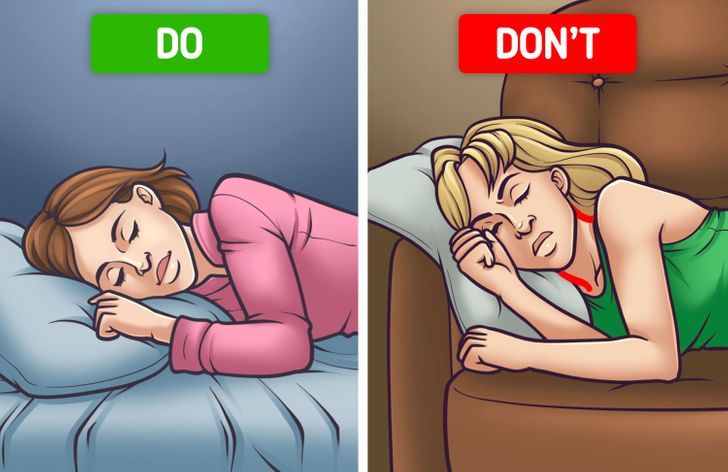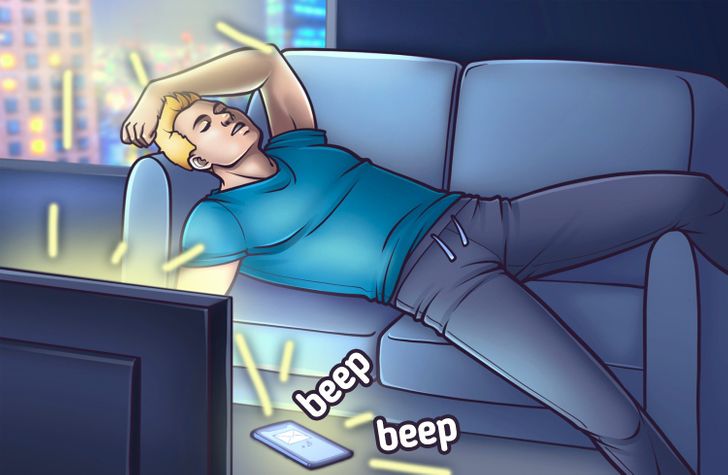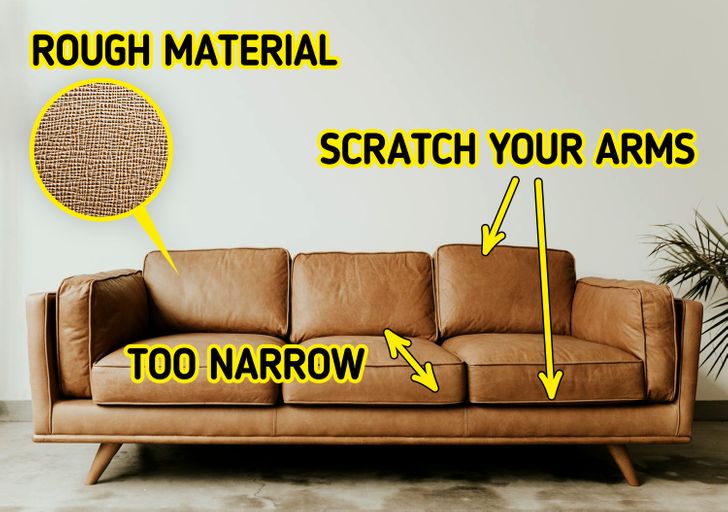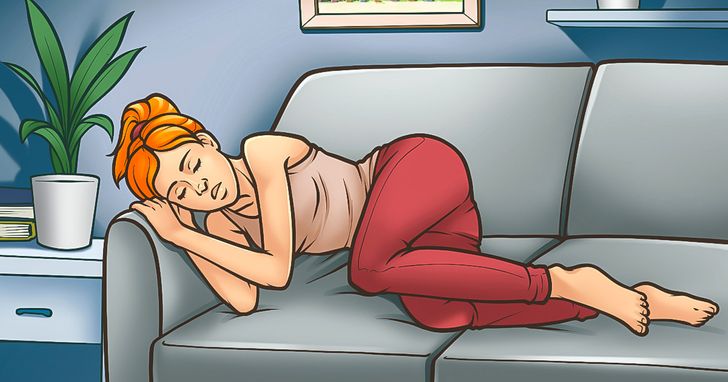Falling asleep on the couch is a common habit—whether it’s during a late-night movie or an impromptu nap. It feels cozy and convenient, but this seemingly harmless act could be sabotaging your health and sleep quality. From poor sleep hygiene to physical discomfort, the consequences of couch sleeping might linger longer than you expect. In this in-depth guide, we’ll uncover why dozing off on your sofa can haunt you and offer practical healthy sleep habits to reclaim your rest. Let’s dive into the surprising downsides and how to break the cycle.
The Hidden Filth: Why Your Couch Is a Hygiene Nightmare

Dirt, Dust, and Allergens Lurking Beneath
Your couch might look inviting, but it’s likely a breeding ground for dirt and germs. Unlike your bed, which is typically covered with washable sheets, couches accumulate dust mites, pet dander, and sweat over time. According to WebMD, dust mites thrive in upholstered furniture, triggering allergies or asthma—especially when your face is pressed against it during sleep.
Spills and Bacteria Build-Up
Think about the last time you spilled snacks or drinks on your couch. A study from Healthline notes that fabric sofas harbor bacteria like E. coli or Staphylococcus from everyday use. Sleeping there exposes you to these unseen threats, potentially leading to skin irritations or respiratory issues. For those seeking sleep hygiene tips, this alone is a compelling reason to stick to your bed.
How It Haunts You
The dirt on your couch doesn’t just stay there—it transfers to your skin and lungs, disrupting your immune system and sleep quality. Regularly cleaning your sofa or investing in hypoallergenic covers can help, but it’s no substitute for a sanitized mattress designed for rest.
Sleeping Posture Problems: How Your Couch Misaligns Your Body

The Wrong Angle for Your Spine
Couches aren’t built for sleep—they’re designed for sitting. When you fall asleep on one, your body often contorts into awkward positions, straining your spine. Mayo Clinic warns that poor sleeping posture can lead to chronic back pain, a common complaint among couch sleepers. Without proper support, your neck and lower back bear the brunt, leaving you stiff and sore.
Neck Pain and Muscle Tension
Ever woken up with a crick in your neck after a couch nap? That’s because sofa cushions lack the ergonomic design of pillows tailored for sleep. According to Spine-Health, misaligned sleeping positions increase muscle tension, which can haunt you with lingering discomfort all day. For back pain relief, a supportive mattress is non-negotiable.
Long-Term Consequences
Over time, habitual couch sleeping could contribute to posture issues like forward head syndrome or sciatica. Investing in mattress reviews to find a bed that supports your spine is a smarter move than risking your health on a sofa.
Distraction Central: Why Your Couch Keeps You Awake

Noise and Light Exposure
Your living room—home to your couch—is rarely a sleep sanctuary. TVs blaring, family chatter, or street noise can jolt you awake, disrupting your sleep cycles. The Sleep Foundation explains that environmental distractions prevent deep, restorative sleep, leaving you groggy. Unlike a bedroom, where blackout curtains and quiet reign, the couch exposes you to constant interruptions.
The Temptation of Screens
Falling asleep on the couch often happens while watching TV or scrolling your phone. Blue light from screens suppresses melatonin, the sleep hormone, as noted by Harvard Health. This delays your ability to drift off fully, even if you doze, leading to fragmented rest that haunts your energy levels.
Breaking the Cycle
Healthy sleep habits demand a distraction-free zone. Moving to your bedroom, where sleep aids like white noise machines or dim lighting can enhance rest, beats battling the chaos of a living room couch any day.
Comfort Conundrum: Why Your Couch Fails the Sleep Test

Lack of Space and Support
Couches are too short for most adults to stretch out fully, forcing you into a fetal position or dangling limbs off the edge. Sleep Advisor highlights that this cramped setup prevents proper muscle relaxation, a key component of quality sleep. Unlike a mattress, which offers uniform support, a couch’s uneven cushions create pressure points that disrupt rest.
Temperature Troubles
Ever wake up sweaty or chilled on the couch? Sofas don’t regulate temperature like breathable bedding. A Medical News Today study notes that optimal sleep requires a cool environment—something leather or fabric upholstery can’t provide. This discomfort haunts your sleep quality, leaving you tossing and turning.
The Comfort Comparison
For true rest, comfort is king. A bed with a top-rated mattress (check mattress reviews for options) offers the space, support, and temperature control your couch can’t. If you’re stuck on sofa naps, a throw blanket and lumbar pillow might help, but they’re no match for a proper sleep setup.

The Bigger Picture: How Couch Sleeping Haunts Your Health
Sleep Deprivation Risks
Consistently poor sleep on the couch compounds into sleep deprivation. The CDC links inadequate rest to higher risks of obesity, diabetes, and heart disease—serious hauntings from a seemingly innocent habit. Fragmented sleep also impairs focus and mood, affecting your daily life.
Impact on Mental Health
Your couch might feel like a stress-reliever, but it’s a false friend. Research from Psychology Today shows that irregular sleep environments increase anxiety and depression. For mental clarity, sticking to a bedroom routine is a proven sleep hygiene strategy.
Weight Gain Connection
Surprisingly, couch sleeping could even sabotage weight loss goals. Disrupted sleep alters hunger hormones, driving cravings for junk food, per Healthline. A cozy sofa nap might feel good, but its ripple effects could haunt your waistline.
Breaking the Habit: Tips for Better Sleep Hygiene
Create a Bedroom Oasis
Transform your bedroom into a sleep haven with a quality mattress, blackout curtains, and a cool temperature (around 65°F, as recommended by Sleep.org). This beats the couch’s chaos every time.
Wind Down Properly
Avoid falling asleep on the couch by establishing a pre-sleep routine. Dim lights, read a book, or try sleep aids like chamomile tea—small steps that signal your body it’s time for bed, not the sofa.
Invest in Comfort
If back pain or discomfort lingers, explore mattress reviews for options tailored to your needs. Brands offering back pain relief features can turn restless nights into rejuvenating ones, leaving couch sleeping in the past.
Conclusion: Stop Letting Your Couch Haunt Your Sleep
Falling asleep on the couch might seem like a harmless indulgence, but its downsides—dirty surfaces, poor posture, distractions, and discomfort—can haunt your health in unexpected ways. Your bed, not your sofa, is where quality sleep happens. Prioritize sleep hygiene, invest in a supportive mattress, and banish those restless nights for good. Ready to upgrade your rest? Share your thoughts or explore the resources below for more healthy sleep habits!









Leave a Reply